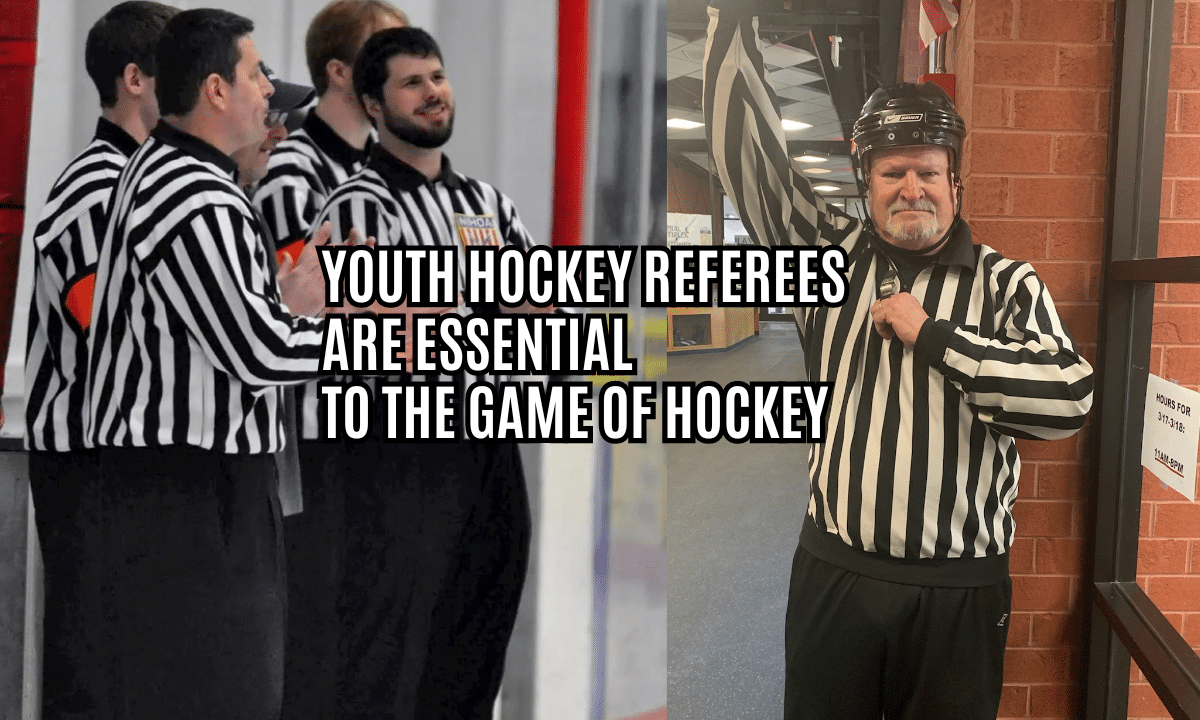Youth hockey referees are an integral part of the game, ensuring that players abide by the rules and regulations while ensuring that the game is played safely. However, being a youth hockey referee is not an easy job. They face a lot of challenges, and it’s important that we understand and empathize with them. Below, we unpack some of the perspectives of players, parents, coaches, and referees on referring in youth hockey.
From the perspective of the players, it can be frustrating when a call doesn’t go your way. Emotions can run high, and players can become angry or upset with the referees. Instead of getting upset and taking it out on the official, we recommend staying the course. Keep your head in the game, shake off the feeling of anger or upset and get ready for the next play. It’s not your job to decide if the call is correct or not. Your job is to play your best and play by the rules.
It’s important to remember that referees are human, and they can make mistakes. It’s not always easy to see everything that’s happening on the ice, and sometimes calls are missed. It’s also important to remember that referees are doing their best to make the right call, and they are not intentionally trying to hurt or hinder a team.
The perspective of the parents can most definitely be frustrating. Keeping a cool head and remembering your parent code of conduct you signed at the beginning of the season can be of assistance in what you choose to let bother you. You are your hockey player’s role model. Set a good example. Cheer respectfully and be ready to move on to the next play.
As a parent attending our child’s hockey games, we found myself observing the youth hockey officials with a mix of admiration and understanding. Young referees, often not much older than the players themselves, demonstrate an impressive level of composure and dedication. Seasoned officials are important to the game as well. It’s not our call to determine their level of expertise, if they are the correct level for our kid’s team, let the kids play and respect the refs’ calls.
Despite the fast-paced and sometimes intense nature of the game, these officials navigate the rink with confidence, making split-second decisions that can significantly impact the outcome. We appreciate the responsibility they shoulder in ensuring fair play and player safety.
One way to think about the referees’ role is that they are teaching valuable life skills, such as leadership, communication, and the ability to handle pressure, all while fostering a love for the sport of hockey.
While occasional disagreements may arise from passionate parents, I recognize the essential role these youth hockey officials play in maintaining the integrity of the game and creating a positive environment for our children to learn and grow as athletes.
From the perspective of the coaches, they want what’s best for their team. They may feel like a call has been unfair, or that their team has been treated unfairly. It’s important to remember that coaches have a responsibility to model good sportsmanship for their players, and that includes respecting the decisions of the referees.
Over the years we’ve seen too many coaches set a poor example for their players getting wrapped up in the moment and losing their cool. How do you expect your players to stay focused and play a good game when you’re yelling at the ref? It doesn’t help the kids, the refs, the parents, or your coaching staff.
From the perspective of the referees themselves, they have a lot of pressure on them. They need to be knowledgeable about the game and its rules, and they need to be able to make split-second decisions. They also need to be able to handle confrontational players or coaches, which can be intimidating for anyone. There are officiating levels and as long as they are there to facilitate the game, that’s all anyone can ask for.
It’s not uncommon for referees to receive criticism or even abuse from players, coaches, or parents. Remember those codes of conduct… Players, Parents, and Coaches! We all sign them stating we will respect others, including the referees. The next time you are thinking, I’m going to disrespect the ref, you are breaking your code of conduct. That’s not acceptable. It’s important to remember that referees are there to help the game run smoothly, and they deserve our respect and appreciation.
It’s also important to remember that youth hockey referees are often young themselves. They may be learning how to handle difficult situations, and they may not always get it right. It’s important to be patient, and offer support and encouragement as they grow and develop.
Youth hockey referees play a vital role in the game, and it’s important to understand and empathize with them. They face a lot of challenges and pressures, and we must respect and appreciate the work that they do. By treating referees with kindness and respect, we can help create a positive environment for everyone involved in the game. Be kind, be respectful, and remember to thank a referee at your next game. They are just as much a part of our amazing hockey community as every one of us.
Yours in Hockey
Brian & Whitney Harrington
We hope you have an awesome hockey season! We know these tips will get you off on the right skate!
Want more tips on having a great hockey tournament experience, follow us on Social Media. We share what our tournament attendees have to say and our tournament experiences and tips daily. With 30 years of experience organizing youth hockey tournaments, we are the go-to for a great tournament experience. We look forward to having your team participate in a Showdown Tournament!

